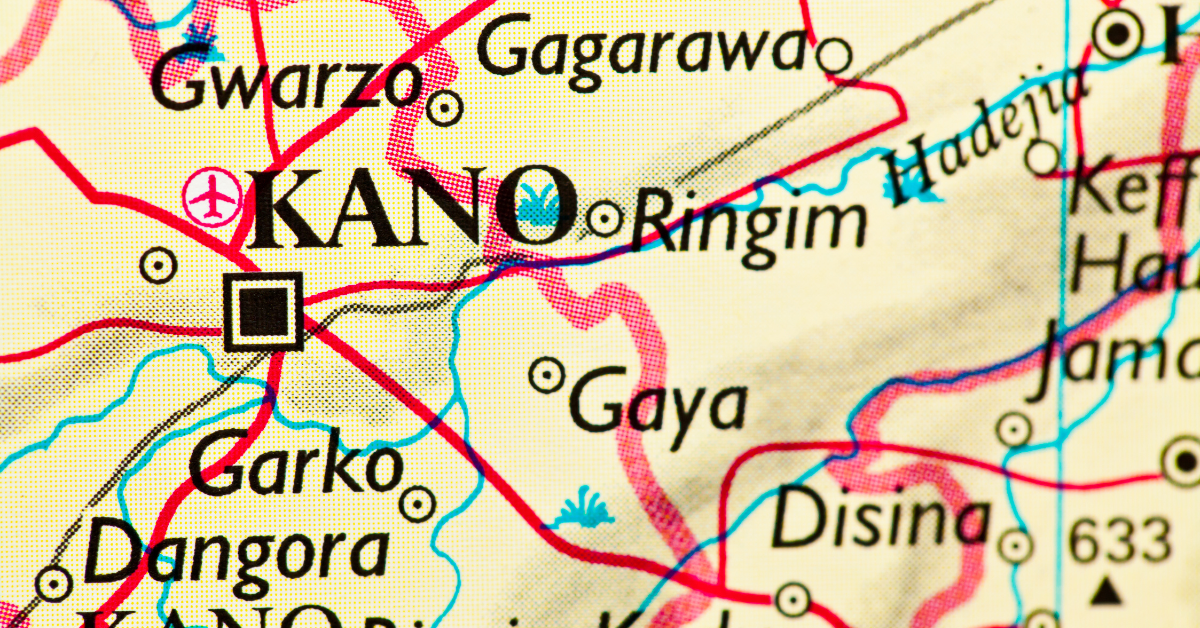Kano, a historic and cultural center in northern Nigeria, has no kanji representation in Japanese. Instead, the katakana spelling “カノ” shapes the way Japanese people perceive the city. This article explains why no kanji exists and explores the unique impressions Japanese people have of Kano.
Why Kano Has No Kanji Representation
Kano is one of Nigeria’s most historic and prominent cities, yet it does not have a fixed kanji representation in Japanese. In contrast, Chinese and Korean city names are often written in kanji due to their strong ties with the kanji-writing tradition. Nigeria, however, is in Africa and uses English and Hausa as official languages, without any historical connection to kanji.
In Hausa, the city is written as “كَنُواْ” in Ajami script, which is derived from the Arabic script. Since this writing system does not correspond to kanji, Japanese usage relies solely on katakana. Newspapers, school textbooks, and international reports consistently adopt “カノ” (Kano in katakana).
Comparison of Main Representations
| Language | Script | Notes |
|---|---|---|
| Japanese | カノ (Kano) | Unified katakana representation |
| English | Kano | Internationally recognized spelling |
| Hausa | كَنُواْ | Written in Ajami script |
Thus, Kano has no kanji representation, and katakana is the only accepted form in Japanese.
The Impressions Japanese People Have of Kano
For Japanese speakers, the name “Kano” generates several impressions.
First, the sound resembles common Japanese surnames such as “Kano” (加納) or “Kano” (叶). This similarity gives the city a sense of familiarity, as if it were a person’s name.
At the same time, the katakana script emphasizes its foreign origin, giving it an exotic and fresh nuance. Because the name is short and simple, it is easy to pronounce and remember. However, due to limited historical and cultural ties between Japan and Nigeria, most Japanese people cannot visualize the city itself. For many, Kano is a place they have heard of but know little about.
Summary of Japanese Impressions
| Impression | Detail | Background |
|---|---|---|
| Similar to personal names | Same sound as surnames like “加納” or “叶” | Creates familiarity |
| Exotic and fresh | Short and simple foreign city name | Strongly influenced by katakana script |
| Lack of information | Difficult to picture the actual city | Few ties between Japan and Nigeria |
In short, for Japanese people, Kano carries both a sense of familiarity and exoticism.
Kano and Its Connection to Sports
Kano is not only important in terms of culture and economy but also plays a major role in sports, especially football. The most famous example is the football club Kano Pillars, which competes in Nigeria’s professional league. Their matches are known for passionate support, and the club is a symbol of pride for local residents.
Kano’s Features in Sports
| Sport | Feature | Recognition in Japan |
|---|---|---|
| Football | Kano Pillars are one of Nigeria’s top clubs | Low, but noticed during international matches |
| Wrestling | Traditional forms are popular | Almost unknown in Japan |
| Athletics | Young athletes are being developed | Limited recognition |
Football is the most popular sport in Nigeria, and Kano is one of the cities that embodies this football culture. During international tournaments, when Nigeria’s national team performs well, Kano’s name indirectly reaches Japanese audiences.
In addition, traditional festivals in Kano often include sporting events, blending culture and athletics. Although Japanese people rarely encounter these aspects, growing international exchange could boost Kano’s recognition in the future.
How Japanese Perceive the Name Kano
From a linguistic perspective, Japanese speakers find “Kano” easy to pronounce and remember. Compared with other African city names, it is short and phonetically simple, which makes it more approachable despite being foreign.
Comparison with Other African City Names
| City | Number of syllables | Impression among Japanese |
|---|---|---|
| Kano | 2 | Easy to remember, approachable |
| Nairobi | 4 | Exotic, slightly complex |
| Johannesburg | 7 | Long and difficult to pronounce |
This comparison shows that Kano is short, simple, and linguistically friendly for Japanese speakers. However, because of limited information, the name often circulates without a clear image of the actual city.
Conclusion
Kano is a leading city in northern Nigeria, yet there is no kanji representation for its name in Japanese. Instead, it is consistently written in katakana as “カノ.”
For Japanese people, Kano evokes two contrasting impressions: it feels familiar because it sounds like a Japanese surname, but it also seems exotic and distant because it represents an African city.
Moreover, Kano plays a key role in sports, especially football, with the Kano Pillars symbolizing its identity. In the future, cultural and sporting exchanges may further raise Kano’s recognition in Japan.
Ultimately, Kano is a city whose name combines familiarity and exoticism, sparking curiosity among Japanese people and offering a gateway to new cultural perspectives.






